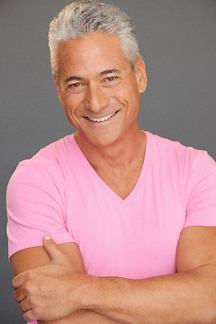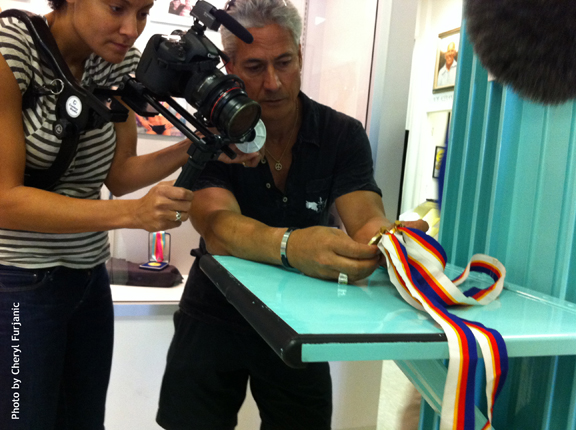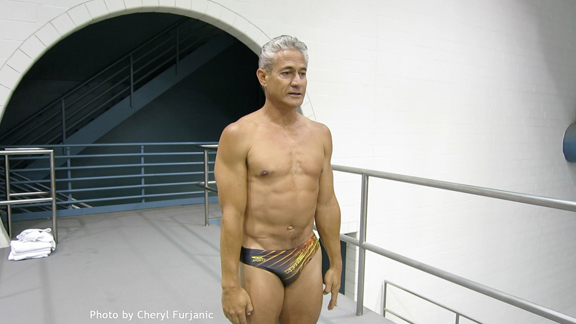
 While award-winning Olympic diver Greg Louganis has made a jump back into the public spotlight as a diving coach on the ABC reality television show Splash, he is also being filmed for a new feature-length documentary, Back on Board, directed by Cheryl Furjanic and set for a 2014 release. I chatted with Greg a bit to learn more about his reflections on gay communities, meeting other HIV-positive folks, the importance of mentorship and what it's been like to be filmed for his documentary since he initially sent ripples across the world with his diving accident at the 1988 Summer Olympics in Seoul.
While award-winning Olympic diver Greg Louganis has made a jump back into the public spotlight as a diving coach on the ABC reality television show Splash, he is also being filmed for a new feature-length documentary, Back on Board, directed by Cheryl Furjanic and set for a 2014 release. I chatted with Greg a bit to learn more about his reflections on gay communities, meeting other HIV-positive folks, the importance of mentorship and what it's been like to be filmed for his documentary since he initially sent ripples across the world with his diving accident at the 1988 Summer Olympics in Seoul.
Randall Jenson: Greg, can you share a little bit about what you were like as an introverted child? Were you an effeminate boy?
Greg Louganis: [Laughs.] You know, I just did a speaking engagement at a TEDx Talk, and I spoke about this. Yeah, I was effeminate, you know? And now I can own it. Before, I viewed it as something that was bad. I judged it. Now I just see it and realize, "Yeah, it's fine. It's who I am."
Jenson: So why did you choose diving? Why was that the focus for you?
Louganis: Well, it was kind of an evolution for me, because I started out in dance and acrobatics when I was a year and a half [old], before I went onstage when I was 3. I had a dance partner, and we would do talent competitions all over California. I then followed my partner into gymnastics. I had a pool in my backyard, and I was trying some of my gymnastic stunts off the diving board. My mom didn't want me to kill myself, so she got me lessons. The first day after she took me out to lessons, they asked me if I would be on the team. I said, "I'll think about it." I wasn't really excited, because I was so busy with all of that other stuff. But as it turned out, it's really been a tremendous blessing that I was introduced to diving.
Jenson: At what age did you first come out to others and share with someone that you are gay?
Louganis: Sixteen. I was at the Olympic Games, and I went to an older diver. I think he was in college -- I can't remember -- but he was older than me. I came out to him. I said, "You know, I think I'm gay." So he's the first person that I came out to. Actually, it was a little disconcerting, because he wouldn't be in a room with me alone after that. [Laughs.] It was very, very obvious. ... He, at the time, was straight, but he has since come out himself, so I guess my gaydar was working at age 16!
Jenson: So you could spot the "others"?
Louganis: Yeah, yeah! [Laughs.] I think that's why I felt safe with him.
Jenson: So you found out that he's gay years later. Was that a good experience, or was that like, "Why didn't you tell me?!"?
Louganis: Oh no, no, it was great! I just wanted him to be happy.
Jenson: In your private life, when did you first start to connect with other HIV-positive folks for support, and what was that experience like?
Louganis: Probably right after the book came out, back in 1995, because that's when it became public about my HIV status. I'm a serial monogamist. I was always with someone and trusted that person. When '95 hit, I came out with Barbara Walters on 20/20 and Oprah, and the world then all knew. It's just been a process and a journey since then.
Jenson: It seems that you were not only outed to the world as gay but also as HIV-positive and thus had a dual coming-out experience. That's just amazing to me, given the time that it happened. Were you more afraid of others knowing about one of those things than about the other?
Louganis: Well, coming out is a journey. So, for my journey, when I really start to think about it, I was doing Jeffrey in New York at the Minetta Lane Theatre, playing Darius. 'Cause, you know, he was out and proud and on TV. And that was a great experience, because I was able to live my fantasy! So then that's when I knew in my heart that my next step in my life was I wanted to come out with a book and come out about my sexual identity as well as my HIV [status]. It was '94 at the Gay Games that I welcomed all of the athletes by saying that it was great to be "out and proud." So I guess that was kind of my coming out to the world, so to speak, about my sexuality, and then when the book came out, that was my coming out to the world about my HIV.
Jenson: From speaking with the director of your new documentary, Back on Board, I understand that your coach smuggled your HIV meds into the country while you were preparing for and competing in the 1988 Olympics. That's pretty amazing. You elaborated on this by sharing that you were taking AZT every four hours. What was this whole experience like? How did it happen?
Louganis: I didn't have anyone to talk to about my medications. I didn't know anyone who was taking AZT. I was busy diving, so I was a little preoccupied. My coach was really incredible. He always had my best interests at heart and had my back. You know, him and my mom taught me unconditional love. That was an incredibly valuable lesson, not just to hear it, but through action. They showed me what unconditional love is and was and what it feels like. So, yeah, that was pretty incredible.

Jenson: You shared at one point, "I think diving has been good to me, but I think it's time to get on with my life. The medals aren't going to keep you warm at night." Can you share a little bit about what your experience has been like living openly with HIV in gay male communities?
Louganis: It's so funny, being in the position I'm in. I get a lot of messages. I had one HIV-positive person come to me and say, "Oh! There's discrimination amongst our own community regarding HIV," and I asked, "Well, what do you mean?" And he shared, "Well, the dating sites, it's all, 'HIV-negative, UB2.'" And I explained, "You know, I don't think that's really an issue." [Laughs.] Back in the day, when I was on Match.com, there were some of those guys that I met with and I knew it wasn't going to go anywhere, but it was just out of friendship. A lot of time on those dating sites, it is about just reaching out to have somebody to go to the movie with or to hang out with. And for those guys I met, when I asked them, "Hey, it says on your profile, 'HIV-negative, UB2'?" they said, "You know, it's a part of life. You are so out about your HIV status that I'm fine with it." I think that my negative status is probably on their wish list, but the reality of it is your status is not always what other people see.
Jenson: You shared about your coach and mom. Who else would you say has been an important mentor to you? And why is mentorship important?
Louganis: My mentoring dog trainer is Susan Garrett. She's in Toronto, and she's been incredibly important. It has some to do with dog training, but it has a lot to do with life. I think that's key. I have my mom. My coach, Ron O'Brien, is my mentor. Even with my flaws, because we're all human, they accept that. They accept life on life's terms.
Jenson: What do you think about the current dialogue happening surrounding HIV education, and what advice would you share with newly diagnosed HIV-positive individuals?
Louganis: I get a lot of email and Facebook messages from young men who seroconvert. They're scared, tainted, neglectful and start judging themselves. You know, in a lot of cases, accidents happen. Life happens, and it goes back to accepting life on life's terms. Generally, there are lessons to be learned in whatever your experience is. It's important to understand this and have an awareness of being the best person you can be for your own conscience.
Jenson: Finally, after seeing a trailer for Back on Board, it struck me how vulnerable and open you are. But it also celebrates who you are now. Yes, you are a diver, but there is so much more to you than that. What do you hope people will come away with after watching this documentary film about your life?
Louganis: Well, first, I hope they enjoy it. [Laughs.] But I also hope they get a sense of strength. I think a part of my journey has been to accept some of the things that happened to me. You know, they are just events. They weren't good or bad; they're just events. I had to let go of "victim," of "survivor," even. Those things are no longer a part of my life; otherwise I end up giving my power over to something that I'm not in control of.
